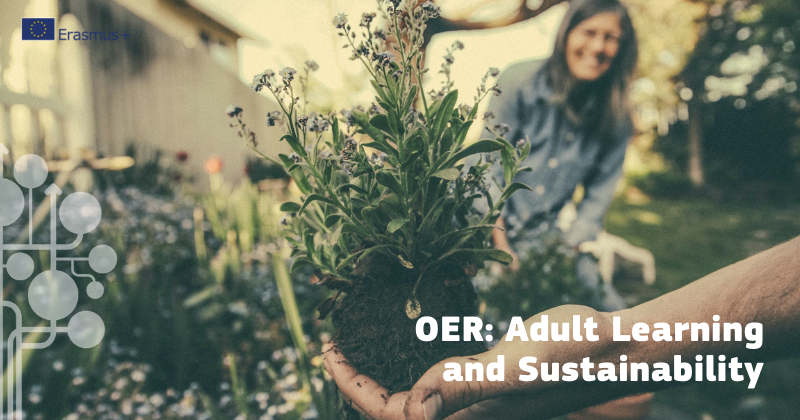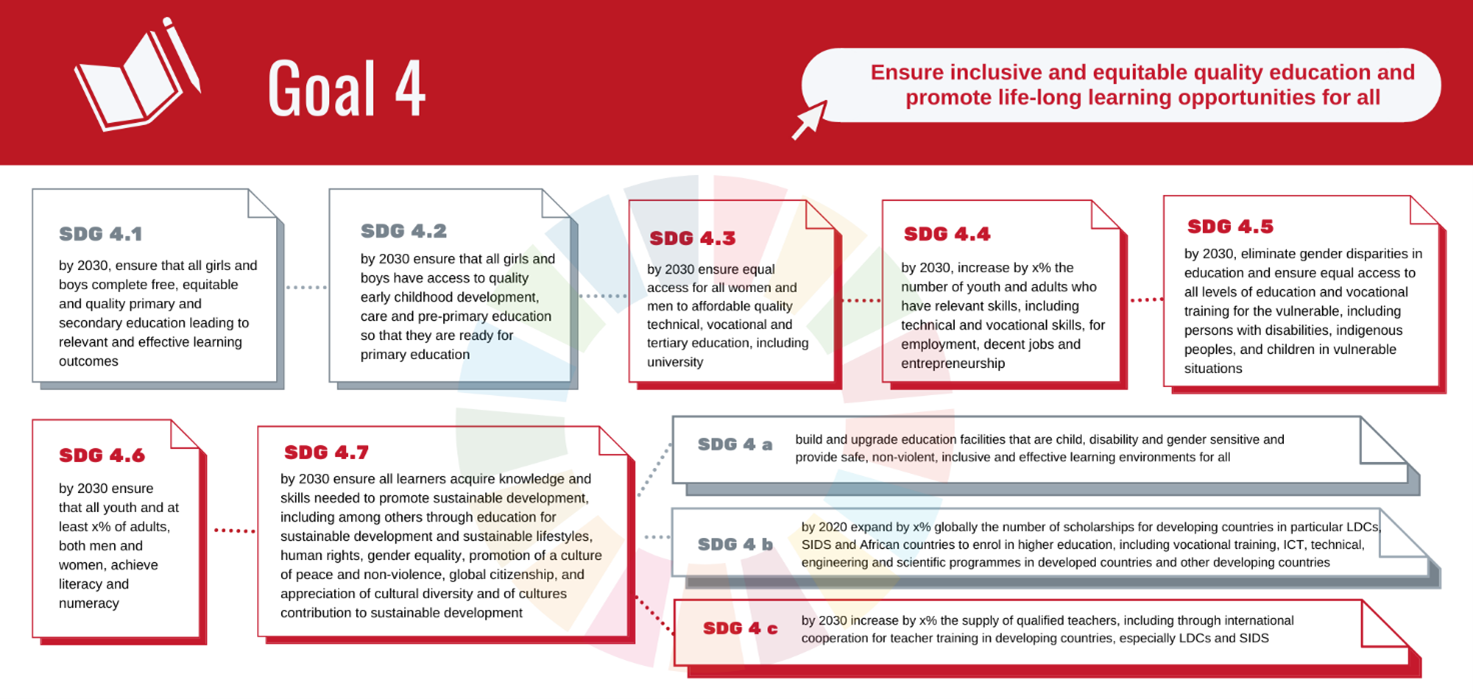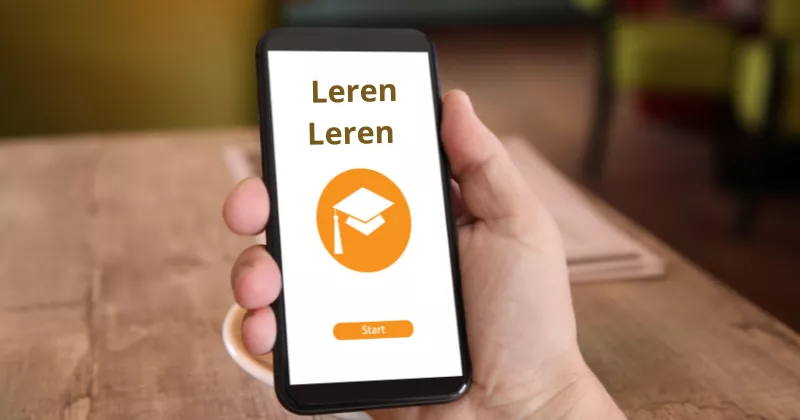OER: Adult Learning and Sustainability

This OER (Open educational resource) includes an article (that you can read here on EPALE platform or download as a pdf), an infographic (that you can download here) and a quiz to assess your competences.
Chapter 1. Overview of global progress in Adult Learning Education and Sustainable Development
Education is a fundamental human right, an invaluable public good and an indispensable tool in building peaceful, sustainable, and fairer societies. Adult Learning and Education (ALE), as a core component of lifelong learning, comprises every form of education and learning that aims to ensure that all adults participate in their societies and the world of work.
ALE is an investment in hope for the future, and equal access to quality education is one of the European Union’s central goals, as education is essential to the vitality of European society and economy.
In today’s world, where humanity is currently using nature 1.75 times faster than our planet’s ecosystems can regenerate, causing irreversible environmental change on a global scale, it is undoubtedly urgent for us to transition to an environmentally sustainable, circular and climate-neutral economy with significant employment and social impacts. All of these environmental challenges must be incorporated into learning processes through Education for Sustainable Development (ESD), focusing on creating a sustainable future, citizen and participatory action, awareness raising and reflection and influencing decision-makers.
ESD, when addressed to adults, can take different forms. It means offering Adult Learning programmes that can equip people with skills, knowledge and competences that allow them to find employment in more environmentally friendly businesses. They can promote more environmentally friendly lifestyles and encourage communities to manage their local environments in sustainable ways. It is about helping learners to become more aware about their society through promotion of active citizenship, health and personal well-being. No less important, it is about helping people to make sustainable choices in their personal and professional lives.
ESD is presently a relevant topic in the policies of international organisations (such as the European Union and UN/UNESCO) and in national contexts. Within the policies implemented for ESD, civil society organisations and social movements undertake projects and activities on Sustainable Development in Education (including Adult Education), that have an important impact by raising awareness of the issues and promoting changes in the behaviour and attitudes of populations.

- The European Green Deal proposed by the European Commission (EC) in December 2019 refers to “activating education and training” by providing support materials, facilitating exchange of good practices and the aim of preparing “a European competence framework to help develop and assess knowledge, skills and attitudes on climate change and sustainable development”. Also according to Green Deal, proactive reskilling and upskilling into green jobs and contributing to green growth are necessary to reap the benefits of the ecological transition. The transition to a green economy requires change across all sectors and occupations, and here Vocational Education and Training (VET) and Adult Education must play a fundamental role. The importance of that role needs to be recognised by policy makers as they look to channel funding into economic recovery.
- The 2030 Agenda for Sustainable Development has as its aim to ensure that, by 2030, all learners acquire the knowledge and skills needed to promote sustainable development. This includes, amongst other things, a thorough education for the development of sustainable lifestyles, human rights, gender equality, promotion of a culture of peace and non-violence, global citizenship and appreciation of cultural diversity and culture’s contribution to sustainable development.
- The Education 2030 Framework for Action: the ESD for 2030 roadmap outlines actions in five priority action areas on policy, learning environments, building capacities of educators, youth and local level action, further stressing ESD’s key role for the successful achievement of the 17 Sustainable Development Goals (SDGs) and the great individual and societal transformation required to address the urgent sustainability challenges. These 17 SDGs are further discussed later in this article.
- The European Skills Agenda is a five-year plan to help individuals and businesses develop more and better skills. Because of the very high percentage of low-skilled adults in one Member State, its National Skills Strategy has shed light on the need to foster a culture of Adult Learning and improve participation and coherence. That is why the EU needs a paradigm-shift on skills in order to strengthen sustainable competitiveness, ensure social fairness and build our resilience.
- The regulation of the European Parliament and of the Council establishing the recovery and resilience facility has the aim of mitigating the economic and social impact of the coronavirus pandemic and making European economies and societies more sustainable, resilient and better prepared for the challenges and opportunities of the green and digital transitions. The Facility includes measures to support the digitalisation of education and training institutions (with investments in ICT infrastructure), including for VET and Adult Learning.
- The UNESCO Recommendation on Adult Learning and Education (RALE): all three fields of learning identified in the Recommendation on Adult Learning and Education (2015) – literacy, continuing training and professional development, and active citizenship – reflect SDG targets.
With the following list, we provide an overview of some policies that provide a framework for Adult Education, both at European and global level:
- The ET 2020 Working Group on Adult Learning was set up in 2020 by the EC and consists of national experts, representatives of European social partners and civil society members. All the information regarding the work and outcomes from the group is available on the Epale Platform in addition to information regarding the network of National Coordinators who promote Adult Learning in their countries, provide policy advice and support, and gather and disseminate best practices.
- The Digital Education Action Plan (2021-2027) outlines the EC’s vision for high-quality, inclusive and accessible digital education in Europe. This Action Plan will support the objective of the Skills Agenda of ensuring that 70% of 16-74-year-olds should have at least basic digital skills by 2025. The new Action Plan also supports the goals of the recently adopted Commission proposal for a Council Recommendation on VET for sustainable competitiveness, social fairness and resilience, which have a strong focus on digital transformation in the Vocational Education and Training sector.
- The Communication on achieving a cohesive European Education Area by 2025, published on 30 September 2020, presents an ambitious approach to making the EEA a reality by 2025. It details the means and milestones to achieve the EEA’s objectives together with EU Member States and education and training stakeholders.
- The New Strategic Agenda for the EU for 2019-2024 adopted by the European Council on 20 June 2019 stresses that Member States “must step up investment in people’s skills and education, do more to foster entrepreneurship and innovation, and increase research efforts, in particular by addressing the fragmentation of European research, development and innovation”.
- The Recommendation on Upskilling Pathways adopted in 2016 aims at helping adults acquire a minimum level of literacy, numeracy and digital skills.
- A European Council Resolution on a renewed European agenda for Adult Learning adopted in 2011 highlights the need to significantly increase adult participation in formal, non-formal and informal learning, whether to acquire work skills, for active citizenship, or for personal development and fulfilment.
- Belém Framework for Action (BFA) is a guide for the global development of adult literacy and Adult Education within the perspective of lifelong learning.
ALE must be seen as a part of a holistic, inter-sectoral, sustainable development agenda that will have multiple benefits and lasting impact. However, ALE by itself cannot overcome issues like discrimination in the labour market or gross income inequalities. This means that stakeholders need to learn how different policies interact with one another, and to understand how to best combine them to achieve lasting impact.
Have a look at this video infographic summarising the main concepts of the OER!
Chapter 2. Rethinking ALE towards the 2030 Agenda for Sustainable Development
In a recent article on the European Association for the Education of Adults (EAEA) website, it was stated that “Adult Education is a driver in the interconnections of the three dimensions of sustainable development (economic, social and environmental) and can contribute to the UN’s 2030 Agenda. There is a real need for ESD, and especially non-formal education has a very high impact.”
Adult Education trends in 2020, based on last country reports (CEDEFOP survey 10.11.2020) stresses that the SDGs continue to have an important role, as they are increasingly interlinked with local and national policy frameworks.
ESD empowers people to change the way they think and work towards a sustainable future. The SDGs adopted by the global community for the next 15 years include ESD. Of the 17 SDGs, SDG 4, “Quality education: why it matters”, is of the greatest relevance to ALE. It calls on countries to “ensure inclusive and equitable quality education and promote lifelong learning” opportunities for all. SDG 4 includes seven substantive targets, each of which is discussed in detail in the Education 2030 Framework for Action.
As shown in Figure 1, six of the ten targets under Sustainable Development Goal 4 relate directly to ALE (4.3, 4.4, 4.5, 4.6, 4.7, 4.c), while four of them address the needs of children.

Figure 1
Adult learning contributes to the achievement of all SDGs by building the foundations of change in the social, political, economic, ecological and cultural spheres. As an example, for a more sustainable agriculture (SDG 2), targeted educational measures are required on the sides of the producers as well as the consumers to acquire a better understanding of ecosystems and their improvement or protection through farming methods and consumption behaviour. The agricultural European Innovation Partnership (EIP-AGRI) presents digital technologies to the providers of farming solutions such as remote measurement of soil conditions, better water management, and livestock and crop monitoring, offering learning tools on their web page.
Ensuring healthy lives (SDG 3) also requires literacy programmes, particularly when it comes to the prevention of disease. Recently approved was the Council of Europe’s Strategic Action Plan on human rights and technologies in biomedicine (2020-2025), designed to protect human dignity, human rights and individual freedoms with regard to the application of biology and medicine. Also, in 2020 the first progress report was published of the Global Action Plan for Healthy Lives and Well-being for All initiative.
Another SDG goal relevant to ALE is SDG 10, “Reduce inequality within and among countries”, which calls for efficient collaboration among communities in a way that is beneficial to all. That is why community-based Adult Education can be a medium through which migrants and locals can come together in an open environment that is free from hierarchy and any kind of biases. An example here is La Verneda School for Adults in Barcelona, a community school that is intercultural and egalitarian in nature. This school has now become a focal point of contact between locals and migrants with a cooperative space for the two groups to learn from each other.
Over the most recent five years of available data, the EU has made progress towards almost all of the 17 SDGs, including SDG 4. Unfortunately, adult participation in learning as a sub-indicator of SDG 4 has registered insufficient progress towards EU targets. According to UNESCO’s fourth Global Report on Adult Learning and Education, in almost one-third of countries, fewer than 5% of adults aged 15 and above participate in education and learning programmes. In too many cases, marginalised groups do not participate in ALE. Also, while women’s participation in ALE is growing, they tend to engage less in programmes for professional development. This raises concern for their participation in the labour market. Member States and the international community must therefore do more to enhance participation among adults, investing more resources and developing effective policies that draw on best practice around the world, particularly in reaching the least advantaged. That is also why Target 4.3 (see Figure 1 above) is a critical one, as the key to achieving all of the SDG4-Education 2030 Agenda lies with the educators focusing on making a major contribution to the improvement of student learning outcomes, with the support of school leaders, government authorities and communities. By 2030, 3.2 million more teachers are required to achieve universal primary education, and 5.1 million more will be needed to achieve universal lower secondary education. This growth in teacher numbers will also be seen in the Adult Education sector.
Successful achievement of the 17 SDGs for addressing social and environmental issues requires an approach based on a lifelong learning model. Special attention has been given at Adult Education level to improving basic skills, investing in language learning, and improving digital and entrepreneurial competences, while at the same time motivating more young people to engage in science-related careers (Council Recommendation of 22 May 2018 on key competences for lifelong learning). Some questions may be raised as to the relevance of the emphasis on digital skills in achieving SDGs. However, the use of digital technologies plays a crucial role in achievement of European Green Deal objectives, as they are powerful enablers for the green economic transition, including for moving to a circular economy and decarbonising energy, transport, construction, agriculture and all other industries and sectors. At present, according to Education and Training 2020 policy, 1 in 4 European adults lack basic ICT skills; and digital learning material is still poorly available in many languages and is needed to improve access to the Internet and mobile devices, also better digital media for adult learners. Also, for economic recovery in the coming years from the impact of the COVID-19 crisis, it is very important to equip Europe’s workers and job seekers with digital skills and also complementary skills such as adaptability, communication and collaboration skills, problem-solving, critical thinking, creativity, entrepreneurship and readiness to learn. It is vital that Adult Learning focuses on these skills. As Technical Vocational Education Training (TVET) plays a key role in the lifelong learning scenario, is very important to take into consideration the rapid changes in technology, both in workplaces and everyday life. As result, it is imperative for TVET educators to develop their own digital skills and keep them up to date. The COVID-19 pandemic has changed the world of work and the sphere of learning and development, creating a lot of challenges for individuals, employers and workers. Open access to resources for TVET Managers and Policy Makers, offered by the International Labour Organization, can be found here.

Actions and initiatives taken at the European level enhance our understanding of how to respond to challenges in the field of Adult Learning. They can also provide support to institutions and individuals and enable a better exchange of knowledge and experiences between countries. Some relevant project examples supporting change in approaches to competence development are:
SWITCH to Green Facility supports EU international cooperation by providing technical assistance where good will or enthusiasm for innovation may be complemented by additional operational knowledge or other capacities. The Facility delivers training and learning events to assist EC staff (at both HQs and Delegations) and international partners, creating dedicated tools contributing to knowledge sharing.
Know your lifestyle – Introducing Sustainable Consumption in 2nd-chance education project is funded with support from the EC, under the EuropAid programme. The aim of the project is to create an innovative pedagogical approach for discussing sustainable consumption and globalisation with second-chance students and to establish a strong thematic network among Adult Education Centres and NGOS about development education.
CYCLE: lifelong learning on Circular Economy project, funded by the EC Erasmus+ programme, has created a series of tools to support the introduction of the skills of Circular Economy in Adult Education, contributing to the creation of a learning path for the teachers themselves.
Greencomp: taking green skills one step further project, developed by EfVET, EARLALL and EAEA, aims at supporting the development of a European framework of green competences. We would like to thank all participants and speakers.
Fields project, funded under the Erasmus+ programme, involves 29 partner organisations from several EU countries and is addressing the current and future skill needs for sustainability, digitalisation and the bio-Economy in agriculture: European Skills Agenda and Strategy. The projects database provides information on the state of the art of the European projects with reference to agriculture, forestry and related sectors (Bio-economy, Digitalisation, Soft Skills and Sustainability).
MYSEA - Mediterranean Youth, NEETs and Women advancing Skills, Employment and Awareness in the Blue and Green Economy project aims at increasing the employability of youth (aged 18 to 24), women (all ages) and NEETs (aged up to 30) in the agri-food and waste management industries by developing training oriented to both sectors. In addition, it seeks to strengthen local governance and sector-skills alliances between economic actors and TVET institutions to align education curricula with the sector’s needs.
BILT project, implemented by UNESCO and UNEVOC, provides TVET institutions with a platform to explore and support the process of identification and implementation of new qualifications and competencies through an ecosystem approach. The project contributes to the identification of new future-oriented qualifications and competencies for relevant TVET careers, with special attention paid to the thematic fields of digitalisation, greening, entrepreneurship and migration, taking into account labour market needs, and economic and socio-political developments.
Skills for the green economy project, a series of country reports developed by CEDEFOP with the aim of investigating the expected impact of environmental and climate change policies on future skills demand within and across sectors, and to provide insights for effective training and education policies and initiatives.
Open Learning Campus (OLC) developed by the World Bank Group as a destination for development learning that will build the leadership and technical capabilities of all development stakeholder-partners, practitioners, policy makers, staff, and the public around the world.
Skills development for a green economy II (SD4GE II) project implemented by German Federal Ministry for Economic Cooperation and Development (BMZ), which aims to create a sustainable basis for cooperation between public and private stakeholders. Although set in South Africa it can provide an interesting model for replication.
Another toolbox for complementing ESD for 2030 roadmap was developed by UNESCO for providing an evolving set of selected resources to support Member States, regional and global stakeholders in developing activities in the five priority action areas: advancing policy, transforming learning environments, building capacities of educators, empowering and mobilising youth and accelerating local-level actions.
In addition, UNESCO has developed a Guide to help leaders and practitioners of TVET improve their understanding and implementation of ESD using a whole-institution approach to greening their institutions.
Chapter 3. Adult Education and Learning focused on green jobs and occupations: Integrating sustainability into TVET
“We are increasingly asking if what people learn is truly relevant to their lives, if what they learn helps to ensure the survival of our planet. Education for Sustainable Development can provide the knowledge, awareness and action that empower people to transform themselves and transform societies.”
(Stefania Giannini, Assistant Director-General for Education, UNESCO).
The role of education in promoting sustainable development is emphasised in Chapter 36 of Agenda 21: Promoting Education, Public Awareness and Training. TVET is given a dual function here. First, training “should have a job-specific focus, aiming at filling gaps in knowledge and skills that would help individuals to find employment”. The second function is to promote competences that are required for sustainable development. This makes clear that integrating sustainability into TVET cannot be reduced to individual vocational subjects or occupations. Training for sustainability competences is at the core of a person’s vocational coping skills, and developing these skills is the goal of Vocational Education.
In a Europe with 26 million registered unemployed people, the green sector offers enormous potential for job creation and we have to make sure Europe can harvest its benefits in full. The understanding of green jobs varies from one country to another. Ultimately, countries will need to compose their own national definitions and set thresholds for practices considered green or non-green. In any case, the key priority for a green economy is to combat climate change and environmental degradation and remove their negative environmental, economic and social impacts. The transition to a green economy depends crucially on coordination and policy coherence.
According the World Employment and Social Outlook 2018, changes in production and use of resources may lead to the creation of around 18 million jobs throughout the world economy. These changes include a shift towards green jobs, based on renewable energy sources and greater efficiency, construction and building services, environmental goods and services, including water and waste management, etc.
The main occupational profiles for green jobs were presented in the Report Skills for a greener future, a publication of the International Labour Organization, and may be seen here in Figure 2.

Figure 2
In the process of greening our present and future lives, education should play an important role. That is why we must be bold and ambitious, recognising more than ever how important is to have competent and prepared adults, equipped with the necessary skills, knowledge and environmental awareness.
Chapter 4. Learning for the future: Competences in Education for Sustainable Development
To shift to a sustainable future, we need to rethink what, where and how we learn to develop the knowledge, skills, values and attitudes that enable us all to make informed decisions and take individual and collective action on local, national and global urgencies. Adults and young people alike need the right set of skills and competences to sustain current standards of living, support high rates of employment and foster social cohesion for tomorrow’s society and world of work. Fostering the development of competences is one of the aims of the vision towards a European Education Area that would be able “to harness the full potential of education and culture as drivers for jobs, social fairness, active citizenship as well as means to experience European identity in all its diversity” (European Commission Communication “Strengthening European Identity through Education and Culture”). The Recommendation on Key Competences for Lifelong Learning adopted in 2018 by the Council of Europe define competences as a combination of knowledge, skills and attitudes, where:
a) knowledge is composed of the facts and figures, concepts, ideas and theories which are already established and support the understanding of a certain area or subject;
b) skills are defined as the ability and capacity to carry out processes and use the existing knowledge to achieve results;
c) attitudes describe the disposition and mind-sets to act or react to ideas, persons or situations.
It further states that “The key competences as defined in this Reference Framework aim to lay the foundation for achieving more equal and more democratic societies. They respond to the need for inclusive and sustainable growth, social cohesion and further development of the democratic culture.” When Adult Education providers sit down to design their courses in a lifelong learning context, all of these factors have to be considered as well a full understanding of the eight key competences reflected in the Recommendation:
- Literacy competence – ability to identify, understand, express, create, and interpret concepts, feelings, facts and opinions in both oral and written forms, using visual, sound/audio and digital materials across disciplines and contexts.
- Multilingual competence – ability to understand, express and interpret concepts, thoughts, feelings, facts and opinions in both oral and written form (listening, speaking, reading and writing) in an appropriate range of societal and cultural contexts according to one’s wants or needs.
- Mathematical competence and competence in science, technology and engineering – ability to develop and apply mathematical thinking and insight in order to solve a range of problems in everyday situations.
- Digital competence – ability to make responsible use of digital technologies for learning, at work, and for participation in society. Individuals should understand how digital technologies can support communication, creativity and innovation, and be aware of their opportunities, limitations, effects and risks.
- Personal, social and learning to learn competence – ability to reflect upon oneself, effectively manage time and information, work with others in a constructive way, remain resilient and manage one’s own learning and career.
- Citizenship competence – ability to act as responsible citizens and to fully participate in civic and social life, based on understanding of social, economic, legal and political concepts and structures, as well as global developments and sustainability.
- Entrepreneurship competence – ability and capacity to act upon opportunities and ideas, and to transform them into values for others, also ability to effectively communicate and negotiate with others, and to cope with uncertainty, ambiguity and risk as part of making informed decisions.
- Cultural awareness and expression competence – ability to understand and respect for how ideas and meaning are creatively expressed and communicated in different cultures and through a range of arts and other cultural forms.
Without these competences, it will not be possible for adults to use the available technology and resources to deliver the expected environmental benefits and economic returns. That is why a very important objective of Agenda 2030 is to further develop the competences of educators in order for them to engage in ESD and contribute to transforming the systems within which they work. The main competences for educators in ESD are presented in the Report “Learning for the future: Competences in Education for Sustainable Development” of the International Commission on Education to UNESCO as seen below in Figure 3.

Figure 3
- LEARNING TO KNOW refers to understanding the challenges facing society both locally and globally and the potential role of educators and learners (The educator understands....). As an example, sustainable development is one of the subjects present on the Learn Europe platform from the perspective of User-Centred Design, which offers accessible and multi-device tools for promoting both formal and informal learning;
- LEARNING TO LIVE TOGETHER contributes to the development of partnerships and an appreciation of interdependence, pluralism, mutual understanding and peace (The educator works with others in ways that....). As an example, the Education for Climate Coalition online platform, which will soon be created, mobilises the education and training community to work towards achieving a climate-neutral and sustainable EU. The online platform will foster the sharing of knowledge and experience, connect education stakeholders and stimulate innovation. From 10 December 2020 to 31 January 2021, the EC invited the education community across the EU to complete a survey to express interest in supporting the work of the Coalition towards realising a climate-neutral, sustainable EU;
- LEARNING TO DO refers to developing practical skills and action competence in relation to ESD (The educator is able to....). As an example, problem-solving is a daily activity for most of us, whether we realise it or not. Learning and understanding the process of problem-solving and recognising patterns in problems is a lifelong activity and a skill that can be applied both in personal and professional lives. This is one of the most essential 21st-century skills for anyone to learn. The EC has identified problem-solving and the ability to solve problems and work collaboratively as a main indicator of the transversal skills to be acquired as part of the key competences. A lot of interesting tools and methods as well as valuable background information and scenarios about problem-solving are offered in the project Support of problem-solving mentality in lifelong learning for Trainers.
- LEARNING TO BE addresses the development of one’s personal attributes and ability to act with greater autonomy, judgement and personal responsibility in relation to sustainable development (The educator is someone who....). For example, TVET staff require initial preparation, as well as continuing training and professional development. That is why educators remain key actors in facilitating learners’ transition to sustainable ways of life. The Guide Greening Technical and Vocational, Education and Training can help leaders and practitioners of TVET improve their understanding and implementation of ESD using a whole-institution approach to greening their institutions.
There is no doubt that irreversible environmental change on a global scale needs an urgent transition to an environmentally sustainable, circular and climate-neutral economy with significant employment and social impacts. These changes will be possible only through ALE as a driver in the interconnections of three dimensions of sustainable development (economic, social and environmental). ALE plays a crucial role in equipping people with needed skills that will allow them to continuously develop and remain competitive on the greener and sustainable labour market.

Bibliography
- A new strategic Agenda for the EU for 2019 -2024 - https://www.consilium.europa.eu/media/39914/a-new-strategic-agenda-2019-2024.pdf
- Greening with jobs - https://www.ilo.org/wcmsp5/groups/public/---dgreports/---dcomm/---publ/documents/publication/wcms_628654.pdf
- Skills for a greener future - https://www.ilo.org/wcmsp5/groups/public/---ed_emp/---ifp_skills/documents/publication/wcms_709121.pdf
- Recommendation on Adult Learning and Education, 2015 -- https://unesdoc.unesco.org/ark:/48223/pf0000245179
- Council Resolution on a renewed European agenda for Adult Learning - https://eur-lex.europa.eu/legal-content/EN/TXT/PDF/?uri=CELEX:32011G1220(01)&from=EN
- COUNCIL RECOMMENDATION of 19 December 2016 on Upskilling Pathways: New Opportunities for Adults - https://eur-lex.europa.eu/legal-content/EN/TXT/PDF/?uri=CELEX:32016H1224(01)&from=EN
- Achieving the European Education Area by 2025 – Communication - https://ec.europa.eu/education/resources-and-tools/document-library/eea-communication-sept2020_en
- Education 2030: Incheon Declaration and Framework for Action for the implementation of Sustainable Development Goal 4 - http://uis.unesco.org/sites/default/files/documents/education-2030-incheon-framework-for-action-implementation-of-sdg4-2016-en_2.pdf
- Learning for the future. Competences in Education for Sustainable Development - https://unece.org/fileadmin/DAM/env/esd/ESD_Publications/Competences_Publication.pdf
- The Digital Education Action Plan (2021-2027) - https://ec.europa.eu/education/sites/default/files/document-library-docs/deap-factsheet-sept2020_en.pdf
- Rethinking Education. Towards a global common good? - https://unevoc.unesco.org/e-forum/RethinkingEducation.pdf
- Greening Technical and VET. A practical guide for institutions - https://unevoc.unesco.org/up/gtg.pdf
- EAEA background paper Adult Education and Sustainability - https://eaea.org/wp-content/uploads/2018/09/AE-and-sustainability_paper_final_9_2018.pdf
- Education and Training 2020. Improving Policy and Provision for Adult Learning in Europe - https://epale.ec.europa.eu/sites/default/files/wg_al_2015_final_report_final_.pdf
- National Action Plan for Agenda 21 -Chap. 36 - https://www.env.go.jp/en/earth/iec/agenda/agenda36.html
About the author
Aurelia Bahnaru holds a PhD in economics and has more than 8 years of experience working in the field of education and training on waste management and circular economy. As President of the Association for Waste Recovery, she has successfully created and coordinated projects in the field of waste management and citizens’ empowerment. Aurelia has also developed representative studies at national level, on local / institutional waste management strategies, waste management programs, training in the field of selective waste collection and greening TVET. She is author of the e-Circular.org project and editor of the Moldovan Journal of Waste Management.
What did you learn with this OER?
Assess your competences with this online quiz! https://www.surveymonkey.com/r/epale_ALE_sustainability
Download
Click here to download this OER!
Click here to download the Infographic!
Commentaar
Education for Sustainability…
Education for Sustainability is indeed crucial for adults, as much as for the younger generation. Unfortunately, at times, it is underestimated!
- Login of registreer om te reageren






ILLECTRONISME
Aujourd'hui des femmes et des jeunes qui ne savent ni lire, ni écrire sont perdus.
Ils travaillent disposent des cartes bancaires, des téléphones portables et les utilisent sans rien comprendre. Ils demandent de l'aide sans arrêt.
Avec le confinement, les bureaux les bureaux sont désertés, il serait opportun de distribuer les ordinateurs de bureau aux familles en difficultés qui puissent apprendre dans le cadre de l'entraide familiale.
Les personnes en difficultés financières n'ont pas les moyens d'acheter des ordinateurs recyclés par les grosses associations.
Si les adultes sont autonomes, les jeunes pourront vaquer à leurs occupations